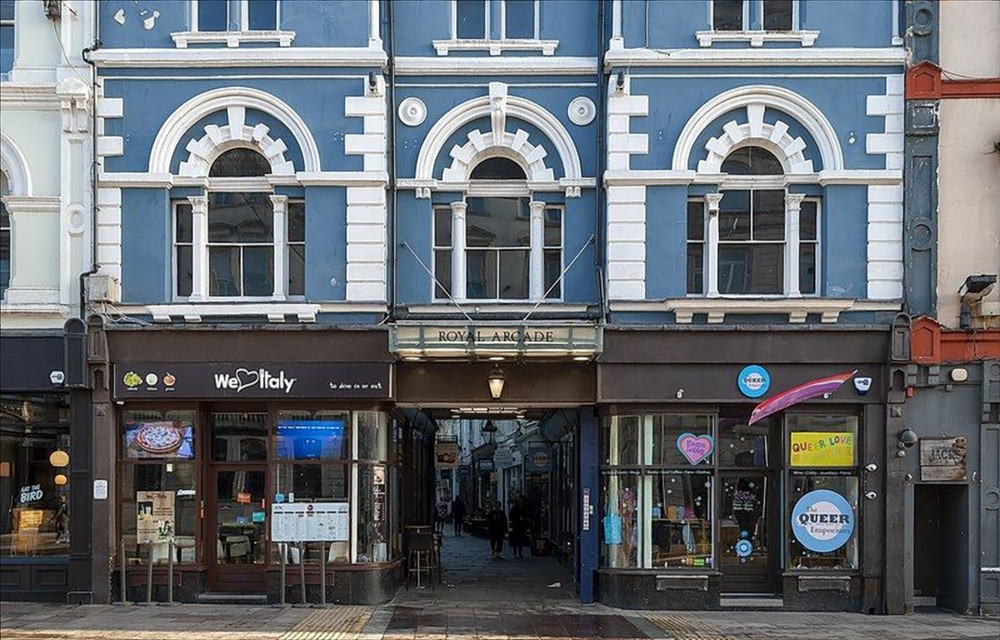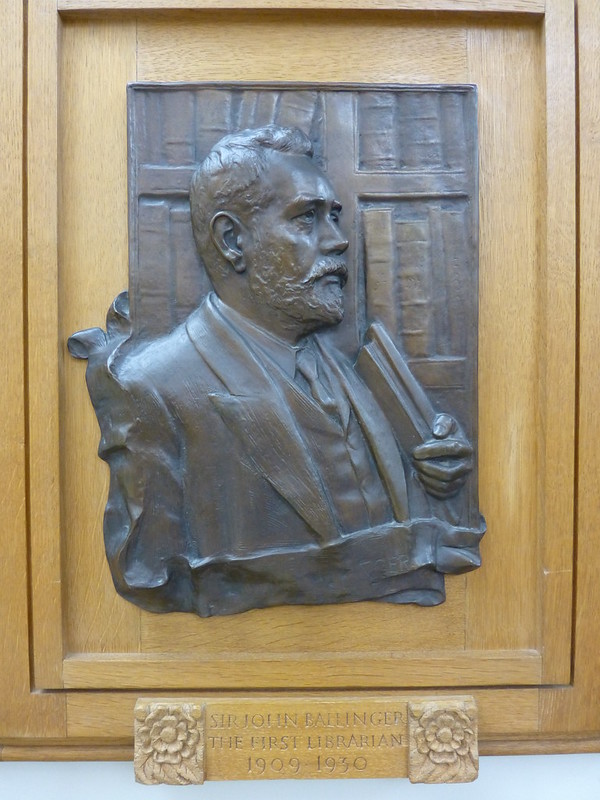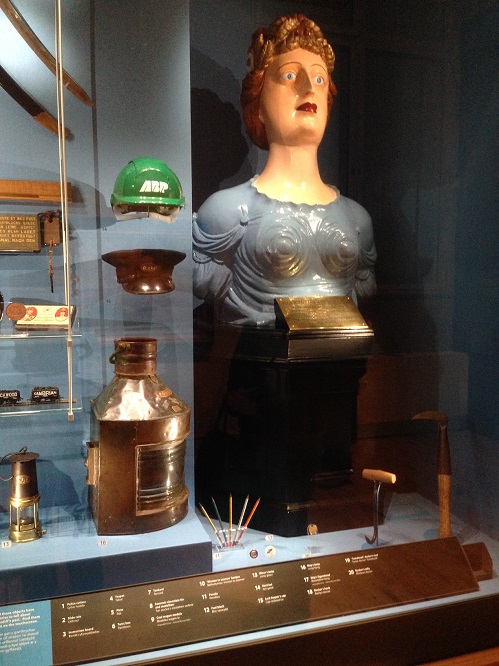‘The Libraries Gave Us Power’: the birth of the public library in Wales

Adam Johannes
In 1861, Cardiff’s first free library available to the general public, opened in a room above the entrance to the Royal Arcade (pictured) on St Mary’s Street. It would be paid for by voluntary subscriptions, It was an immediate hit, wildly popular and oversubscribed, so much so, that it soon had to move across the road to bigger premises.
The Public Libraries Act of 1850 would allow local councils with 5,000 residents or more to raise a rate of one penny in the pound to provide a public library. Cardiff was the first town in Wales to establish a public library.
Where did that burning hunger for knowledge and self-education among the working classes of the age come from? Perhaps it was the fruits of Chartist agitation in the preceding decade for the working class vote, and those great battles for democracy as a means of working class empowerment? During the parliamentary debates on public libraries one MP feared that far from pacifying the more hotheaded worker, as the liberal wing of the establishment hoped, access to the wrong kind of reading materials could make libraries working class “lecture halls” “which would give rise to an unhealthy agitation”.
The Hayes
By 1882 the library had moved to The Old Library on The Hayes where it would remain for over a hundred years.
That year as spring was on the cusp of summer, a public holiday would be announced on a warm day in May by the Lord Mayor of Cardiff. It was to be a special holiday for the entire city to celebrate the opening of its library. City leaders considered the library as an achievement the whole city should be proud of, something to uplift civic life and local democracy. Reportedly the streets around the library’s entrances would be packed with large crowds eager to welcome their public library.
A Western Mail report of the grand library opening would capture its festive spirit describing, “an event which served to keep up in full vigour the happy spirit of Whitsuntide and a brightly smiling sky lent zest to the general enjoyment.”
“There were bell ringings, trade and society processions, conversaziones and speech-making in honour of the event…In a word, all went as merrily as the best friend of the movement could have wished.”
The Western Mail would proclaim that the city had “succeeded in obtaining for itself an institution that has no other aim to fulfil than the furtherance of the general good, which the humblest inhabitant may frequent and yet feel that is no more out of place in than he who revolves in a sphere thrice or three hundred times removed.”
The Dean of Llandaff would call the movement that gave Cardiff its first public library, “a triumph of unselfishness over the lust of money…the existence of a central institution, where the studious of all ages, sexes and conditions can resort to for purposes of study, is a privilege which cannot be too highly rated.”
It was then known as the Cardiff Free Library, Museum and Schools for Science and Art. The library even included an art gallery!

You cannot have libraries without librarians, and so here is Andrew Green, librarian of the National Library of Wales until 2013, writing of its first librarian John Ballinger: “Ballinger arrived in Cardiff as its Librarian in 1884. He was just 24 years old. The Council had decided in 1863 that it would provide a library for all its citizens, under the ‘penny in the pound’ provision of the 1850 Public Libraries Act. Cardiff was the first town in Wales to do so.”
“In 1882 the ‘Old Library’ in The Hayes was opened to the public. Ballinger hugely extended the library and its services. Under his direction the collection grew enormously, to 100,000 volumes, and the number of number of books borrowed increased from 7,000 to 750,000.”
Ballinger our city’s pioneering librarian had a vision and a mission for our city and its people,
“He staged exhibitions, made extensive provision for children, especially through establishing school libraries, set up branch libraries, including the wonderful Cathays building, and was especially interested in new technologies. He developed a wide reputation for his progressive practice, published extensively and was a leading member of the Library Association.”
Andrew Green adds: “By the time Ballinger left Cardiff in 1908 to become the first Librarian of the National Library of Wales, Cardiff possessed a library service that could stand comparison with most of the major city libraries of the UK.”

Currently the Old Library building houses the Museum of Cardiff, also known as The Story Museum, a people’s history museum, which is now under threat of closure in the latest round of Cardiff Council budget cuts. Across the road St David’s Hall, our National Concert Hall of Wales, faces privatisation and being handed over to Live Nation/AMG, an American owned, aggressively commercial private company, by the same council that has failed to stand up for the city against the economic forces of Tory austerity.
In its most recent incarnation, Cardiff Central Library was officially opened in 2009 by the Manic Street Preachers who sang ‘The Libraries Gave Us Power’ (A Design for Life). In 2015, singer James Dean Bradfield would send an angry letter protesting proposed library closures that would later be defeated by mass protest:
“When Nick, Sean and I opened the Cardiff Central Library in 2009, it was an immensely proud moment for us. It felt like a seamless journey from Blackwood Central to Cardiff Central. As Blackwood had been a place to meet, discover and read, so became Cardiff Central library and I continue to use the service with my family. But now it seems that the dream is dead or under threat. Odds on that Cardiff Council will eventually cut a deal to transfer the library into the hands of a luxury retail opportunity. The rumble of an oncoming cultural wasteland as sponsored by Cardiff City Council.”
In the months before the 2014/15 council plot to save money by closing seven libraries, Cardiff Council had in 2013 reduced library opening times for some city libraries. They would no longer be open six days per week, but only five.
Now the council is consulting on plans to cut library opening times again by one day per week, and/or Saturday afternoons. This could mean some libraries in the city would be closed half the week, and open as little as three and a half days per week, and after that will we see another attempt to close more libraries completely?
But it is not all doom and gloom, a campaign is emerging to defend our city’s library service whose roots lie in the dreams of over a century ago. Authors, publishers, library and anti-austerity campaigners have written to the council. Librarians have written impassioned letters. A petition has been launched. People are writing to their local councillors. Protests will soon be planned.
We will not allow any future where articles might be one day be penned telling the story of the last public library in Cardiff.
Support our Nation today
For the price of a cup of coffee a month you can help us create an independent, not-for-profit, national news service for the people of Wales, by the people of Wales.







Libraries are VITAL…..We cannot allow ourselves to become a country where a library is closed, what dose sit say about our civilisation if we close libraries whilst opening up ever more “server farms” to hold information (and this cannot be stressed hard enough) that does not actually exist*? *anything on a screen does not exist. Anything that is in a box made of wires and bits of whatever that you cannot see without a screen, to all intents and purposes in the context of humans’ interaction with the universe, doe snot exist. Everything even so-called “live” broadcasts happened in the… Read more »
We have to face reality that the days of the traditional library are numbered. They are now social hubs. Besides that the footfall has fallen, the choice of books has diminished, books are digitalised, improved access to online knowledge, and new/used books are more affordable.
Libraries had their day. Let’s no gush though, books are controlled, especially history ones. They are community hubs now, which is a good evolution. As digital access makes information in a deeper form available.